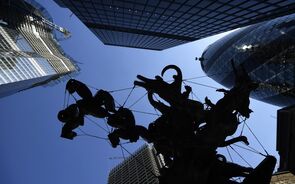Kass: "Wait for the Right Pitch"
1 Mensagem
|Página 1 de 1
Kass: "Wait for the Right Pitch"
"Wait for the Right Pitch"
By Doug Kass
RealMoney Silver Contributor
3/12/2008 11:59 AM EDT
"Market focus moved from the ridiculous on Monday (the Spitzer thing) to the sublime on Tuesday (the Fed thing).
"Like an oversexed guy in a whorehouse, now is the time to invest and get rich."
-- Warren Buffett
But -- ahem -- maybe in light of the magnitude of Tuesday's rise, I got it backwards: Was Monday the sublime day and Tuesday the ridiculous day?
That said, the bulls will revel in the near-record gain of 4% in the indices yesterday, but the bears will no doubt cite that Tuesday's rise failed to offset the 4.7% drop in the S&P 500 over the prior three trading days.
"The stock market is a no-called-strike game. You don't have to swing at everything; you can wait for your pitch. The problem when you're a money manager is that your fans keep yelling, 'Swing, you bum!'"
-- Warren Buffett
My view is that the market is now muddle-valued and both the bullish and bearish camps have something to cheer about. On the positive side, the Federal Reserve's move to expand its securities lending program will generally serve to relieve some of the recent financial stress. It will not, however, serve to alleviate significant secular concerns.
We are in a consumer-led recession -- its depth and duration is currently unknown -- and nothing announced yesterday will alleviate the pressures that led up to the downturn. Weighing heavily on the domestic economy is a levered U.S. consumer whose household debt (measured against incomes) stands at 139% and at over 20% of assets. Amazingly, the giddy party of debt (accompanied by the hope for a never-ending appreciation in home prices) of over the last decade has raised the burden of debt service (interest and principal repayments) to levels 30% higher relative to incomes than they were when interest rates were in double-digit territory during the Volcker era in the early 1980s. The household debt service ratio now stands at 14.28% of personable incomes, an all time high and nearly 400 basis points above levels at which consumer-spending growth launch points occurred. With a weakening labor market, deflated asset values (housing and stocks) and rapidly rising inflation, the outlook for the consumer sector remains blurred.
Earnings expectations for 2008-2010 remain far too optimistic. Tuesday's Fed actions will do nothing to ameliorate the steady degradation of the outlook for corporate profits in the face of slowing top-line sales growth and rising costs. Profit margins, at 57-year highs in 2007, will remain under steady pressure.
The adverse and developing credit loss cycle will not be impacted by the Fed's actions. Importantly, the housing market's health remains on the weakest of foundations just at the time that the non-residential real estate market's contraction is in an early inning. Tuesday's Fed move will not likely produce a rapid improvement in the availability of credit nor meaningfully contract the spread between U.S. treasuries and mortgage-backed paper.
The Fed's initiative is a good "first step" but small (and too late!) compared to the magnitude of the credit problem. The $200 billion Term Securities Lending Facility (TSLF) pales in comparison to the $6.0 trillion in agency (and non-agency) markets. Moreover, the need for such a large and innovative rescue plan further underscores the lack of validity inherent in the ratings agencies' analysis of risk (and AAA ratings!).
Market expectations of aggressive interest rate cuts by the Federal Reserve might now be misplaced. Yesterday's move seems to be a recognition by the Fed that its interest rate cuts have had a limited impact on producing a recovery and, in the meantime, have rendered the unintended consequences of rising inflation and a declining U.S. dollar.
The Fed's recent moves of slashing interest rates between scheduled meetings and the large TSLF suggest that the credit problem could be larger than most recognize. This is especially the case at primary dealers, such as Bear Stearns (BSC - commentary - Cramer's Take - Rating), which are facing a tsunami of financial problems. Here is a great interview (and forecast of bank failures) by Wilbur Ross on this subject on Barry Ritholtz's The Big Picture.
The political risks of a Democratic win in November 2008 remain unchanged.
Bear market rallies are sharp, as short-covering is spirited. The role of short-covering in Tuesday's broad move cannot be precisely determined, but undoubtedly, it played a role. This is especially true as negativity had recently grown and markets were increasingly oversold. That said, every rally of the last 10 months has proven to be an opportunity to sell. The burden of proof remains on the shoulders of the bulls until proven otherwise.
In light of the above circumstances, I am now firmly a market agnostic with no convictions whatsoever, waiting for my right pitch. Quite frankly, sometimes it is best to admit some confusion and to avoid conviction. ~"
(in www.realmoney.com)
By Doug Kass
RealMoney Silver Contributor
3/12/2008 11:59 AM EDT
"Market focus moved from the ridiculous on Monday (the Spitzer thing) to the sublime on Tuesday (the Fed thing).
"Like an oversexed guy in a whorehouse, now is the time to invest and get rich."
-- Warren Buffett
But -- ahem -- maybe in light of the magnitude of Tuesday's rise, I got it backwards: Was Monday the sublime day and Tuesday the ridiculous day?
That said, the bulls will revel in the near-record gain of 4% in the indices yesterday, but the bears will no doubt cite that Tuesday's rise failed to offset the 4.7% drop in the S&P 500 over the prior three trading days.
"The stock market is a no-called-strike game. You don't have to swing at everything; you can wait for your pitch. The problem when you're a money manager is that your fans keep yelling, 'Swing, you bum!'"
-- Warren Buffett
My view is that the market is now muddle-valued and both the bullish and bearish camps have something to cheer about. On the positive side, the Federal Reserve's move to expand its securities lending program will generally serve to relieve some of the recent financial stress. It will not, however, serve to alleviate significant secular concerns.
We are in a consumer-led recession -- its depth and duration is currently unknown -- and nothing announced yesterday will alleviate the pressures that led up to the downturn. Weighing heavily on the domestic economy is a levered U.S. consumer whose household debt (measured against incomes) stands at 139% and at over 20% of assets. Amazingly, the giddy party of debt (accompanied by the hope for a never-ending appreciation in home prices) of over the last decade has raised the burden of debt service (interest and principal repayments) to levels 30% higher relative to incomes than they were when interest rates were in double-digit territory during the Volcker era in the early 1980s. The household debt service ratio now stands at 14.28% of personable incomes, an all time high and nearly 400 basis points above levels at which consumer-spending growth launch points occurred. With a weakening labor market, deflated asset values (housing and stocks) and rapidly rising inflation, the outlook for the consumer sector remains blurred.
Earnings expectations for 2008-2010 remain far too optimistic. Tuesday's Fed actions will do nothing to ameliorate the steady degradation of the outlook for corporate profits in the face of slowing top-line sales growth and rising costs. Profit margins, at 57-year highs in 2007, will remain under steady pressure.
The adverse and developing credit loss cycle will not be impacted by the Fed's actions. Importantly, the housing market's health remains on the weakest of foundations just at the time that the non-residential real estate market's contraction is in an early inning. Tuesday's Fed move will not likely produce a rapid improvement in the availability of credit nor meaningfully contract the spread between U.S. treasuries and mortgage-backed paper.
The Fed's initiative is a good "first step" but small (and too late!) compared to the magnitude of the credit problem. The $200 billion Term Securities Lending Facility (TSLF) pales in comparison to the $6.0 trillion in agency (and non-agency) markets. Moreover, the need for such a large and innovative rescue plan further underscores the lack of validity inherent in the ratings agencies' analysis of risk (and AAA ratings!).
Market expectations of aggressive interest rate cuts by the Federal Reserve might now be misplaced. Yesterday's move seems to be a recognition by the Fed that its interest rate cuts have had a limited impact on producing a recovery and, in the meantime, have rendered the unintended consequences of rising inflation and a declining U.S. dollar.
The Fed's recent moves of slashing interest rates between scheduled meetings and the large TSLF suggest that the credit problem could be larger than most recognize. This is especially the case at primary dealers, such as Bear Stearns (BSC - commentary - Cramer's Take - Rating), which are facing a tsunami of financial problems. Here is a great interview (and forecast of bank failures) by Wilbur Ross on this subject on Barry Ritholtz's The Big Picture.
The political risks of a Democratic win in November 2008 remain unchanged.
Bear market rallies are sharp, as short-covering is spirited. The role of short-covering in Tuesday's broad move cannot be precisely determined, but undoubtedly, it played a role. This is especially true as negativity had recently grown and markets were increasingly oversold. That said, every rally of the last 10 months has proven to be an opportunity to sell. The burden of proof remains on the shoulders of the bulls until proven otherwise.
In light of the above circumstances, I am now firmly a market agnostic with no convictions whatsoever, waiting for my right pitch. Quite frankly, sometimes it is best to admit some confusion and to avoid conviction. ~"
(in www.realmoney.com)
1 Mensagem
|Página 1 de 1



